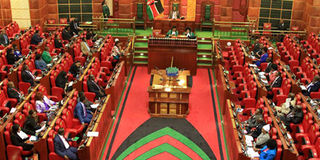Change gender balance status in our politics

Members of Parliament debate the gender bill on November 21, 2018. Increasing the number of women legislators is an important democratic goal. PHOTO | FILE | NATION MEDIA GROUP
What you need to know:
- Women’s entry, participation and advancement in politics is hindered by several socio-economic, cultural and political factors.
- Gender imbalance in the political arena must be considered as problematic from a democratic and a human rights perspective.
Like many other nations, Kenya is a predominantly patriarchal society with deeply entrenched traditional gender roles.
No wonder, despite being 50.5 per cent of the population, women are descriptively and substantively underrepresented in political leadership.
Women’s entry, participation and advancement in politics is hindered by several socio-economic, cultural and political factors such as financial capacity, culture and religion. Globally, more men than women would vie for elective posts.
Increasing the number of women legislators is an important democratic goal, as they are more likely to promote women’s interests compared to their male counterparts.
The Constitution, in Article 27(3), provides for the right to equal opportunities for men and women in the political, economic, cultural and social spheres. But that is yet to be realised, especially in politics and governance.
PARLIAMENT
For instance, the National Assembly has 349 members — 290 elected from every constituency, 47 Woman Reps (one for every county) and 12 nominated MPs representing special interest groups.
The Senate has 67 members — 47 elected senators for each county and 20 nominated ones (16 women and two each representing youth and persons with disabilities).
From the 290 constituencies are only 23 elected women MPs, or eight per cent of the total in the National Assembly. The 47 counties voted in only three women to the Senate, a paltry six per cent of elected senators.
Nairobi County, which hosts the capital city, has only seven elected women (five MCAs, one MP and one Woman Rep) out of 106 elective positions. This represents 6.6 per cent of seats.
Women representation in Kenya’s political space is seemingly pegged at 6.5 per cent.
REFERENDUM
It’s important that this changes because gender equality is both morally and economically crucial.
Gender imbalance in the political arena must be considered as problematic from a democratic and a human rights perspective.
Due to lack of quorum, Parliament has failed — four times — to pass the Gender Bill, meant to institutionalise implementation of the two-thirds gender rule as per Article 81(b) of the Constitution.
One way Kenya can achieve gender parity in politics is through a referendum.
Typically held under universal suffrage, a plebiscite would amalgamate several issues — including gender balance in the Legislature — as the electorate simply votes for or against the referendum question.
There has already been talk of a referendum by several key political leaders — including President Uhuru Kenyatta, Deputy President William Ruto and Opposition leader Raila Odinga — in regard to the need for electoral reforms.
CAMPAIGN
Political parties can adopt gender quotas. They can voluntarily field an equal number of male and female candidates and ensure gender parity in their hierarchies. Countries with such quotas have a high women representation.
Media can also play a major role in promoting gender equality by redefining the public’s perception of women’s leadership ability and capacity.
A Media Council of Kenya report indicates widespread gender inequalities. Despite women having made great strides in the political, economic and social spheres, they are much less likely to be featured in news stories, interviewed or their opinion on topical issues sought as compared to men.
Ms Taa is a fashion designer and commentator on governance issues. [email protected]




